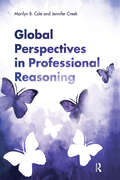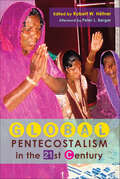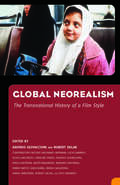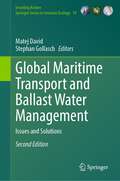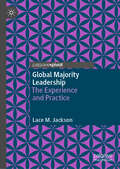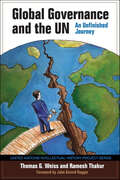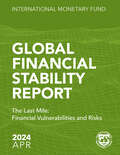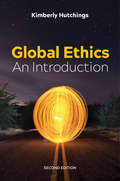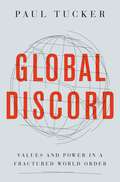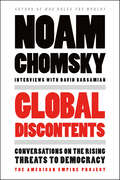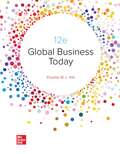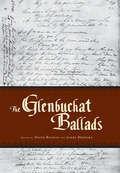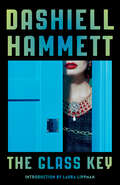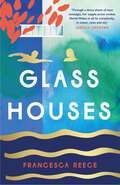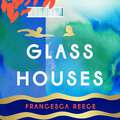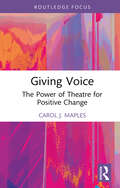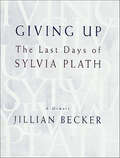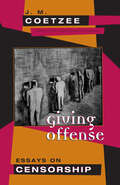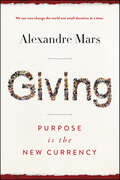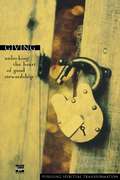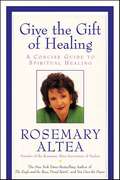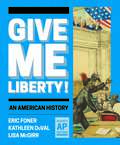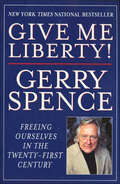- Table View
- List View
Global Perspectives in Professional Reasoning
by Jennifer Creek Marilyn B. ColeGlobal Perspectives in Professional Reasoning is the first text of its kind to address the broader scope of occupational therapy practice and the different types of professional reasoning that can be employed, including strategic, political, nonlinear, creative, and social reasoning. This text encompasses a wide range of thinking skills and cognitive processes used by occupational therapists, from reflecting on practice to solving problems, and from reasoning in the clinic to reasoning in the wider political, social, and cultural worlds.Marilyn B. Cole and Jennifer Creek and their contributors are therapists, educators, and scholars who have explored new areas of professional practice and written about the thought processes that reinforced their actions. The authors come from around the world, providing a global perspective while also demonstrating that occupational therapists within different cultures serve remarkably similar human needs: to be included in their communities, to have occupational choices, and to determine their own life course.Many of the contributors in Global Perspectives in Professional Reasoning have identified and analyzed their own thought processes as they tackled complex and challenging tasks, often in unfamiliar contexts. These challenging tasks have produced several entirely original conceptualizations of professional reasoning, such as development and spiritual reasoning. The contributors start by observing what is going on, try to make sense of the situation, and then work out what to do. Other contributors are fascinated by a theory, a policy, or an approach; study it; and then look for ways to utilize it in practice. Most of the time, contributors focus their attention on the process of reasoning rather than on the specific types of reasoning they are employing or on desired outcomes.Inside Global Perspectives in Professional Reasoning, each chapter charts the learning process that contributors went through as they extended their thinking skills and processes to meet the challenges they encountered. All the chapters describe reasoning in practice and all of them utilize theory. A broad and fresh take on professional reasoning in occupational therapy practice, Global Perspectives in Professional Reasoning is the perfect resource for occupational therapy students and clinicians who want to utilize reasoning to tackle the most complex and challenging of tasks.
Global Pentecostalism in the 21st Century
by Peter L. BergerThis state-of-the-field overview of Pentecostalism around the world focuses on cultural developments among second- and third-generation adherents in regions with large Pentecostal communities, considering the impact of these developments on political participation, citizenship, gender relations, and economic morality. Leading scholars from anthropology, sociology, religious studies, and history present useful introductions to global issues and country-specific studies drawn from Latin America, Africa, Asia, and the former USSR.
Global Neorealism: The Transnational History of a Film Style
by Saverio GiovacchiniContributions by Nathaniel Brennan, Luca Caminati, Silvia Carlorosi, Caroline Eades, Saverio Giovacchini, Paula Halperin, Neepa Majumdar, Mariano Mestman, Hamid Naficy, Sada Niang, Masha Salazkina, Sarah Sarzynski, Robert Sklar, and Vito ZagarrioIntellectual, cultural, and film historians have long considered neorealism the founding block of post-World War II Italian cinema. Neorealism, the traditional story goes, was an Italian film style born in the second postwar period and aimed at recovering the reality of Italy after the sugarcoated moving images of fascism. Lasting from 1945 to the early 1950s, neorealism produced world-renowned masterpieces such as Roberto Rossellini's Roma, città aperta (Rome, Open City, 1945) and Vittorio De Sica's Ladri di biciclette (Bicycle Thieves, 1947). These films won some of the most prestigious film awards of the immediate postwar period and influenced world cinema. This collection brings together distinguished film scholars and cultural historians to complicate this nation-based approach to the history of neorealism. The traditional story notwithstanding, the meaning and the origins of the term are problematic. What does neorealism really mean, and how Italian is it? Italian filmmakers were wary of using the term and Rossellini preferred "realism." Many filmmakers confessed to having greatly borrowed from other cinemas, including French, Soviet, and American. Divided into three sections, Global Neorealism examines the history of this film style from the 1930s to the 1970s using a global and international perspective. The first section examines the origins of neorealism in the international debate about realist esthetics in the 1930s. The second section discusses how this debate about realism was “Italianized” and coalesced into Italian “neorealism” and explores how critics and film distributors participated in coining the term. Finally, the third section looks at neorealism’s success outside of Italy and examines how film cultures in Latin America, Africa, Asia, and the United States adjusted the style to their national and regional situations.
Global Maritime Transport and Ballast Water Management: Issues and Solutions (Invading Nature - Springer Series in Invasion Ecology #16)
by Matej David Stephan GollaschIn 2015 the first edition of this book was published before the Ballast Water Management (BWM) Convention entered into force. To our knowledge this was and still is the first comprehensive book on BWM worldwide. It provided an overview of possible solutions to the complex issue of BWM. It further outlined consequences and implications to address the ballast water "problem" in line with provisions of the BWM Convention considering environmental, shipping, legal and policy perspectives. The previously addressed subjects remain essential, but new subjects appeared which more recently have proven to be critical for the effective BWM Convention implementation. After the first book content was already agreed and in preparation, new advances were achieved in BWM-related research around the world. Further, new experience was gained and issues came out during the preparation processes of countries for the BWM Convention implementation. The editors of the first book remained heavily involved in BWM-related research and other processes, hence these new critical BWM issues and subjects are now dealt with in the second edition of this book to complement the first one. In essence, this new book covers main issues that arose recently during the implementation of the BWM Convention. Scientists and experts with extensive experience in these subjects from around the globe from academic and private sectors, as well as national administrations, were involved in the preparation of this book.
Global Majority Leadership: The Experience and Practice
by Lace M. JacksonThis book explores the challenges that individuals of African, Caribbean, Asian and South-East Asian descent (Global Majority leaders) living in the UK may face in attaining, practising, and experiencing leadership within organisations. By drawing firstly on critical race theory, the author shines a light on the underlying contextual and power structures of societies like the UK, in which these individuals' leadership and identity construction is shaped, experienced, and practised. Secondly, the author uses a qualitative research strategy to uncover the dominant genres and occluded themes hidden within the narratives of Global Majority leaders as they illuminate the fine-grained detail of their lived experience with and in leadership. With these two lenses, the book allows us to understand and theorise how, through the shaping and influencing of meaning, Global Majority leaders continue to develop and practice leadership, which has implications for theory, policy and practice. Contributing to critical leadership and organisational studies, as well as the UN Sustainable Goals that relate to reducing inequality, decent work and economic growth, and promoting inclusive and accountable institutions, this book is a valuable resource that can influence leadership practice, diversity, equality and inclusion strategies within contested spaces.
Global Governance and the UN: An Unfinished Journey (United Nations Intellectual History Project Series)
by Thomas G. Weiss Ramesh ThakurIn the 21st century, the world is faced with threats of global scale that cannot be confronted without collective action. Although global government as such does not exist, formal and informal institutions, practices, and initiatives—together forming "global governance"—bring a greater measure of predictability, stability, and order to trans-border issues than might be expected. Yet, there are significant gaps between many current global problems and available solutions. Thomas G. Weiss and Ramesh Thakur analyze the UN's role in addressing such knowledge, normative, policy, institutional, and compliance lapses. The UN's relationship to these five global governance gaps is explored through case studies of some of the most burning problems of our age, including terrorism, nuclear proliferation, humanitarian crises, development aid, climate change, human rights, and HIV/AIDS.
Global Financial Stability Report, April 2024: The Last Mile: Financial Vulnerabilities And Risks (Global Financial Stability Report)
by [authors]A report from the International Monetary Fund.
Global Ethics: An Introduction
by Kimberly HutchingsThis revised edition of Kimberly Hutchings’s best-selling textbook provides an accessible introduction to the field of Global Ethics for students of politics, international relations and globalization. It offers an overview and assessment of key perspectives in Global Ethics and their implications for substantive moral issues in global politics. These include the morality of state and non-state violence, the obligations of rich to poor in a globalizing world, and the scope and nature of international human rights. The second edition contains expanded coverage of pressing contemporary issues relating to migration, changes in the technologies of war, and the global environment. Hutchings’s excellent book helps non-specialist students to understand the assumptions underpinning different moral traditions, and enables them to formulate their own views on how to approach moral judgement and prescription – essential in a world which, though it is shared by all, possesses massive cultural differences and inequalities of power.
Global Discord: Values and Power in a Fractured World Order
by Paul TuckerHow to sustain an international system of cooperation in the midst of geopolitical struggleCan the international economic and legal system survive today’s fractured geopolitics? Democracies are facing a drawn-out contest with authoritarian states that is entangling much of public policy with global security issues. In Global Discord, Paul Tucker lays out principles for a sustainable system of international cooperation, showing how democracies can deal with China and other illiberal states without sacrificing their deepest political values. Drawing on three decades as a central banker and regulator, Tucker applies these principles to the international monetary order, including the role of the U.S. dollar, trade and investment regimes, and the financial system.Combining history, economics, and political and legal philosophy, Tucker offers a new account of international relations. Rejecting intellectual traditions that go back to Hobbes, Kant, and Grotius, and deploying instead ideas from David Hume, Bernard Williams, and modern mechanism-design economists, Tucker describes a new kind of political realism that emphasizes power and interests without sidelining morality. Incentives must be aligned with values if institutions are to endure. The connecting tissue for a system of international cooperation, he writes, should be legitimacy, creating a world of concentric circles in which we cooperate more with those with whom we share the most and whom we fear the least.
Global Discontents: Conversations on the Rising Threats to Democracy (The American Empire Project)
by Noam Chomsky David BarsamianIn a compelling new set of interviews, Noam Chomsky identifies the “dry kindling” of discontent around the world that could soon catch fire.In wide-ranging discussions with David Barsamian, his longtime interlocutor, Noam Chomsky asks us to consider “the world we are leaving to our grandchildren”: one imperiled by climate change and the growing potential for nuclear war. If the current system is incapable of dealing with these threats, he argues, it’s up to us to radically change it.The twelve interviews in Global Discontents examine the latest developments around the globe: the rise of ISIS, the reach of state surveillance, growing anger over economic inequality, conflicts in the Middle East, and the presidency of Donald Trump. In personal reflections on his Philadelphia childhood, Chomsky also describes his own intellectual journey and the development of his uncompromising stance as America’s premier dissident intellectual.
Global Business Today
by Charles HillGlobal Business Today sets the standard for International Business courses and is the proven choice at both the undergraduate and graduate level. It offers a complete solution that is relevant (timely, comprehensive), practical (focused on applications of concepts), and integrated (logical flow of topics from chapter to chapter). The success of the first eleven editions (and its longer, more in-depth textbook option, International Business, now in the 13th edition) was based on the incorporation of leading-edge research, the use of the up-to-date examples and statistics to illustrate global trends and enterprise strategy, and the discussion of current events within the context of the appropriate theory. Building on these strengths, the goals for the 12th edition have focused on the following: 1. Incorporate new insights from scholarly research. 2. Make sure the content covers all appropriate issues. 3. Make sure the text is up-to-date with current events, statistics, and examples. 4. Add new and insightful opening and closing cases in most chapters. 5. Incorporate value-added global EDGE™ features in every chapter. 6. Connect every chapter to a focus on managerial implications.
Glencoe iScience: Structure and Function, Grade 6
by Juli Berwald Michelle Anderson American Museum of Natural HistoryNIMAC-sourced textbook
The Glenbuchat Ballads
by David BuchanSometime in the early nineteenth century, most likely in the year 1818, the Reverend Robert Scott, minister of the parish of Glenbuchat in Aberdeenshire, Scotland, compiled a collection of traditional ballads that until now has not been published. Most of the ballad collections produced during the Scottish Romantic Revival were eventually anthologized in Francis James Child's seminal English and Scottish Popular Ballads (five volumes, 1882-96). Yet, the Glenbuchat manuscripts, containing sixty-eight ballads in four folio volumes, were not included in Child's volumes. The complete work only came to light in 1949 when it was donated to the Special Collections of the Aberdeen University Library by a descendent of the original compiler. Scott did not give the precise locations of where he collected his ballads or name the performers, but the texts are unique and appear to have been drawn from oral sources. As such, the ballads reveal a great deal about the nature of traditional music at the time they were collected. The Glenbuchat Ballads were originally prepared for publication by David Buchan, one of the leading ballad scholars of the twentieth century. Upon Buchan's death, his former student James Moreira took up and completed his work and wrote the detailed introductory essay and annotations in this volume.
The Glass Key (Crime Masterworks Ser. #No.11)
by Dashiell HammettNed Beaumont is a gambler and a professional troubleshooter for his friend Paul Madvig, a cheerfully corrupt political power broker who aspires to greater things. Madvig has his eyes set on none other than the daughter of Senator Ralph Bancroft Henry, the heiress to a dynasty of political purebreds. When the senator&’s son turns up dead, Madvig becomes the prime suspect. But if he is innocent, then which of his dozens of enemies is doing an awfully good job of framing him?Dashiell Hammett&’s tour de force of crime fiction combines a bulletproof plot, authentically corrupt characters, and writing of telegraphic crispness.*With a new introduction by Laura Lippmann*
Glass Houses: 'A devastatingly compelling new voice in literary fiction' - Louise O'Neill
by Francesca Reece'Through a dewy sheen of teen nostalgia, Reece deftly explores the weight of political events on individual lives. Her supple, visceral prose evokes North Wales in all its complexity, beautifully rendered in water, resin and sky'Jessica Andrews, author of Saltwater and Milk Teeth'Francesca Reece is a devastatingly compelling new voice in literary fiction' Louise O'Neill, author of Asking For It and Idol_______Somewhere, in a box in Margot Yates' attic there's a video of Gethin by the lake at Ty Gwydr. He's young - nineteen, maybe twenty. It's late spring and dusk, and a low sun leaks white light into the horizon behind the dark fringe of trees. Olwen is filming. Gethin narrows his eyes at the camera. Her bodiless voice says to him, I love it here. He says, good. This place is ours.Forester Gethin Thomas is struggling to make ends meet in his rural hometown in North Wales. Bright, charming, but unambitious, the thing that keeps him going is Ty Gwydr, a beautiful lakeside house that he keeps an eye on for absent English owners. The house has been empty for so long he's come to think of it as his own.That is until the owners decide to sell, sending Geth into freefall. And when he discovers that Olwen, his first love who left him and their small town for a new life in London, has returned to North Wales with her husband, Geth and Olwen will find themselves pulled back into the past and what could have been - or still could be.But soon mysterious messages start arriving at the house, and they must question whether this is the love story they thought it was, or whether there might be something altogether more sinister lurking beneath the surface.
Glass Houses: 'A devastatingly compelling new voice in literary fiction' - Louise O'Neill
by Francesca Reece'Through a dewy sheen of teen nostalgia, Reece deftly explores the weight of political events on individual lives. Her supple, visceral prose evokes North Wales in all its complexity, beautifully rendered in water, resin and sky'Jessica Andrews, author of Saltwater and Milk Teeth'Francesca Reece is a devastatingly compelling new voice in literary fiction' Louise O'Neill, author of Asking For It and Idol_______Somewhere, in a box in Margot Yates' attic there's a video of Gethin by the lake at Ty Gwydr. He's young - nineteen, maybe twenty. It's late spring and dusk, and a low sun leaks white light into the horizon behind the dark fringe of trees. Olwen is filming. Gethin narrows his eyes at the camera. Her bodiless voice says to him, I love it here. He says, good. This place is ours.Forester Gethin Thomas is struggling to make ends meet in his rural hometown in North Wales. Bright, charming, but unambitious, the thing that keeps him going is Ty Gwydr, a beautiful lakeside house that he keeps an eye on for absent English owners. The house has been empty for so long he's come to think of it as his own.That is until the owners decide to sell, sending Geth into freefall. And when he discovers that Olwen, his first love who left him and their small town for a new life in London, has returned to North Wales with her husband, Geth and Olwen will find themselves pulled back into the past and what could have been - or still could be.But soon mysterious messages start arriving at the house, and they must question whether this is the love story they thought it was, or whether there might be something altogether more sinister lurking beneath the surface.
Glass Houses: 'A devastatingly compelling new voice in literary fiction' - Louise O'Neill
by Francesca Reece'Through a dewy sheen of teen nostalgia, Reece deftly explores the weight of political events on individual lives. Her supple, visceral prose evokes North Wales in all its complexity, beautifully rendered in water, resin and sky'Jessica Andrews, author of Saltwater and Milk Teeth'Francesca Reece is a devastatingly compelling new voice in literary fiction' Louise O'Neill, author of Asking For It and Idol_______Somewhere, in a box in Margot Yates' attic there's a video of Gethin by the lake at Ty Gwydr. He's young - nineteen, maybe twenty. It's late spring and dusk, and a low sun leaks white light into the horizon behind the dark fringe of trees. Olwen is filming. Gethin narrows his eyes at the camera. Her bodiless voice says to him, I love it here. He says, good. This place is ours.Forester Gethin Thomas is struggling to make ends meet in his rural hometown in North Wales. Bright, charming, but unambitious, the thing that keeps him going is Ty Gwydr, a beautiful lakeside house that he keeps an eye on for absent English owners. The house has been empty for so long he's come to think of it as his own.That is until the owners decide to sell, sending Geth into freefall. And when he discovers that Olwen, his first love who left him and their small town for a new life in London, has returned to North Wales with her husband, Geth and Olwen will find themselves pulled back into the past and what could have been - or still could be.But soon mysterious messages start arriving at the house, and they must question whether this is the love story they thought it was, or whether there might be something altogether more sinister lurking beneath the surface.
Giving Voice: The Power of Theatre for Positive Change (ISSN)
by Carol J. MaplesThis book is a practical guide for using the power of theatre to address issues of oppression in areas such as race, ethnicity, LGBTQ+, gender, and sexual harassment.Giving Voice charts a roadmap for the process of establishing a troupe, including auditioning members, utilizing authentic source material, directing rehearsals, guiding mindful growth among troupe members, and facilitating an inclusive forum environment. Rooted in Augusto Boal’s Theatre of the Opressed and using the nationally recognized Missouri State University’s Giving Voice troupe as a model, this book provides guidance for customizing the program’s principles to meet the needs of your school, community, organization, or business. Giving Voice forums bring professional development to a new level. Applications include diversity and cultural awareness training in educational settings for students, staff, faculty, and administrators, as well as those in non-profit and for-profit organizations.This book provides a powerful and proven approach to creating a truly inclusive climate. It is a guidebook for accessible use in the secondary and university setting in theatre and performance studies. It has also been shown to be effective for businesses and other organizations.
Giving Up: The Last Days of Sylvia Plath
by Jillian BeckerGiving Up is Jillian Becker's intimate account of her brief but extraordinary time with Sylvia Plath during the winter of 1963, the last months of the poet's life. Abandoned by Ted Hughes, Sylvia found companionship and care in the home of Becker and her husband, who helped care for the estranged couple's two small children while Sylvia tried to rest. In clear-eyed recollections unclouded by the intervening decades, Becker describes the events of Sylvia's final days and suicide: her physical and emotional state, her grief over Hughes's infidelity, her mysterious meeting with an unknown companion the night before her suicide, and the harsh aftermath of her funeral. Alongside this tragic conclusion is a beautifully rendered portrait of a friendship between two very different women.
Giving Offense: Essays on Censorship
by J.M. CoetzeeWinner of the 2003 Nobel Prize in Literature. J. M. Coetzee presents a coherent, unorthodox analysis of censorship from the perspective of one who has lived and worked under its shadow. The essays collected here attempt to understand the passion that plays itself out in acts of silencing and censoring. He argues that a destructive dynamic of belligerence and escalation tends to overtake the rivals in any field ruled by censorship. From Osip Mandelstam commanded to compose an ode in praise of Stalin, to Breyten Breytenbach writing poems under and for the eyes of his prison guards, to Aleksander Solzhenitsyn engaging in a trial of wits with the organs of the Soviet state, Giving Offense focuses on the ways authors have historically responded to censorship. It also analyzes the arguments of Catharine MacKinnon for the suppression of pornography and traces the operations of the old South African censorship system. "The most impressive feature of Coetzee's essays, besides his ear for language, is his coolheadedness. He can dissect repugnant notions and analyze volatile emotions with enviable poise."—Kenneth Baker, San Francisco Chronicle Book Review "Those looking for simple, ringing denunciations of censorship's evils will be disappointed. Coetzee explicitly rejects such noble tritenesses. Instead . . . he pursues censorship's deeper, more fickle meanings and unmeanings."—Kirkus Reviews "These erudite essays form a powerful, bracing criticism of censorship in its many guises."—Publishers Weekly "Giving Offense gets its incisive message across clearly, even when Coetzee is dealing with such murky theorists as Bakhtin, Lacan, Foucault, and René; Girard. Coetzee has a light, wry sense of humor."—Bill Marx, Hungry Mind Review "An extraordinary collection of essays."—Martha Bayles, New York Times Book Review "A disturbing and illuminating moral expedition."—Richard Eder, Los Angeles Times Book Review
Giving: Purpose Is the New Currency
by Alexandre MarsDubbed “the little French Bill Gates” in his native country, Alexandre Mars quit the startups that made him rich, transforming himself from entrepreneur to philanthropist. Determined to become a responsible and effective giver, Mars traveled around the world, asking two very simple questions. “Do you give to charity?” “Do you give enough?” While all answered yes to the first question, their second answer—“no” surprised him. From Hong Kong to Paris to New York, he met numerous people passionate about making the world a better place, yet unsure of how to do so. Certain there must be a better answer than volunteerism or blank checks, Mars began Epic, a foundation that allows for users to donate directly to rigorously vetted charities while seeing their impact in real time.Epic takes no cut—100 percent of the donations reach the people who need them. In this vital book, Mars not only tells the story of Epic and its new formula for giving but redefines what it means to give and have purpose. Like the millennial generation driving much of today’s change, Giving is about holding the new centers of power—multinational corporations—accountable to society. People are passionate about social causes, and want to donate their time, money, and skills. Combining Mars’ extensive knowledge and experience in tech and economics with the real-life stories of NGOs, Giving provides the inspiration, tools, and insight we can use to make our modern and unpredictable world a better place.100% of the author's proceeds will go the Epic portfolio organizations to help disadvantaged youth.
Giving: Unlocking the Heart of Good Stewardship (Pursuing Spiritual Transformation)
by John Ortberg Laurie Pederson Judson PolingJesus said more about money than just about any other topic. Clearly, it is an important issue--and a touchy one! Deep down, we know it is not a matter of what we earn but how we manage what we earn that shows our ultimate priorities.Giving demonstrates how good stewardship is more than a responsibility—it’s an adventure. As you study the connection between your wallet and your heart, you’ll learn how money management is a powerful tool for shaping your character. You’ll discover how giving is as much a part of spiritual growth as prayer and Bible study. And you’ll learn about the rewards of cultivating wise financial habits and a generous heart. Above all, you’ll find out how a lifestyle of giving reflects the heart of God, who freely gives his best to you.Leader’s guide included!Giving group sessions are:Money: Why Is It So Important to God?The Open Hands of GodTithing: A Training Exercise for the HeartBehind the Scenes of DebtWhat Is a Biblical Lifestyle?Cultivating a Heart of CompassionThe Chance of a Lifetime
Give the Gift of Healing: A Concise Guide to Spiritual Healing
by Rosemary AlteaFrom The New York Times bestselling author of The Eagle and the Rose and Proud Spirit comes a book on spiritual healing.Rosemary Altea, the internationally renowned medium known to millions worldwide as "The Voice of the Spirit World," is also the founder of the Rosemary Altea Association of Healers, a charitable organization with patients worldwide. In this book package, Rosemary offers an introduction to spiritual healing, beginning with a personal account of how she embraced her role as a healer sixteen years ago. Sharing her belief that sickness and pain can cause the soul to live in a dark place, Rosemary presents healing techniques designed to give light - the Seven Steps to Self-Healing. We meet two inspiring patients who have been treated by Rosemary and her team of healers, and we learn how we can harness the power of our own thoughts and use color energy visualizations to achieve inner peace. Also included is a color chart explaining how each of eight vibrant hues can give us the gift of healing.
Give Me Liberty! (Seventh AP® Edition): An American History
by Eric Foner Kathleen DuVal Lisa McGirrThe gold standard for AP® U.S. History Give Me Liberty! is beloved by instructors and students alike because it delivers a concise and authoritative American history that explains not just what happened but why. Aligned with the nine-part structure of the AP® U.S. History course and filled with opportunities to hone AP® skills and to practice AP® writing, the text provides students with the foundation they need to be successful on the AP® exam and beyond. In the Seventh Edition, Eric Foner welcomes acclaimed scholars Kathleen DuVal and Lisa McGirr as co-authors. Together, they have enhanced coverage of Native American history with an emphasis on how it refines our understanding of freedom—the book’s urgent guiding theme. AP® is a trademark registered and/or owned by the College Board, which was not involved in the production of, and does not endorse, this product.
Give Me Liberty!: Freeing Ourselves in the Twenty-First Century
by Gerry SpenceHere, in this landmark personal work, Gerry demonstrates how, despite the democratic rhetoric we hear and believe, we have become enslaved. All of us are trapped by a complex web of corporate and governmental behemoths he calls the "New Slave Master" that today controls our airways, educates our children, and manages every facet of our lives.Yet, far from being a pronouncement of gloom, Give Me Liberty! is an inspiring and visionary work. In the spirit of his bestselling How to Argue and Win Every Time, Spence expounds on his philosophy, thus empowering us to:Liberate the slave within, redefine success, unchain the spirit, escape the religions of work and beliefs that enslave us, free ourselves with what he calls our "magical weapon."Like Thomas Paine's Common Sense, Give Me Liberty! captures the underlying malaise of a country, transforming it into a national dialogue that promises a groundswell for a meaningful democracy in America in the coming years.
